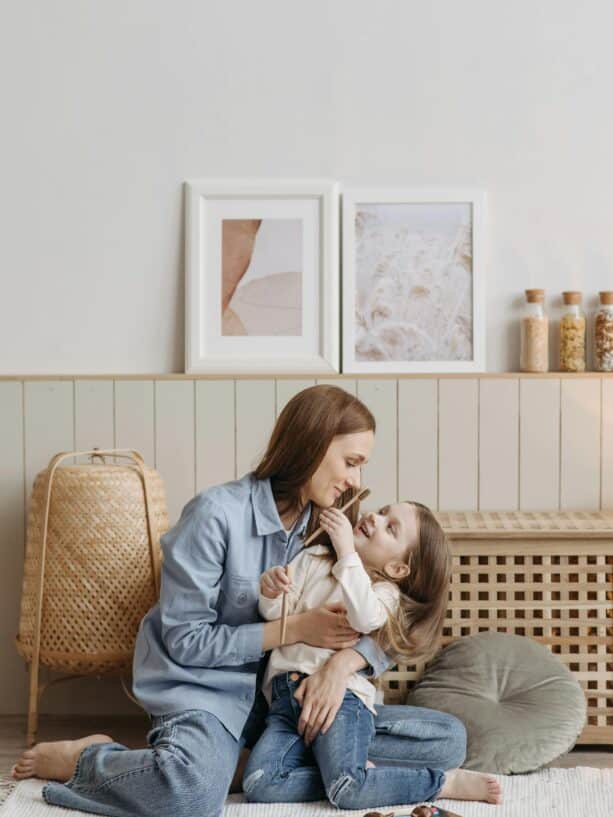TL;DR –Becoming a parent can retrigger grief about your own childhood trauma with unexpected intensity—the profound love you feel for your child sharply contrasts what you didn't receive, evoking questions like "If this is what love is, did they even love me?" When you find yourself working desperately to provide the safety, attunement, and unconditional acceptance you lacked, implicit and explicit memories surface of your own neglect or abuse, triggering anger you thought was resolved. This resurgence isn't regression but invitation—grief isn't linear or one-dimensional, and parenthood positions you to access deeper layers of healing than were previously possible.
The contrast is excruciating: cuddling your baby while remembering touch-starved nights, protecting your child fiercely while recalling how unprotected you were, answering every cry while remembering yours went unheard. Yet this retriggered grief, though painful atop the physical exhaustion of new parenthood, serves a purpose—we cannot heal what we cannot feel, and these feelings open portals to metabolize old wounds more completely. By actively grieving what you didn't receive while simultaneously providing it for your child, you're not just breaking cycles but transforming generational trauma into generational healing, giving both yourself and your child what every human deserves.
Grieving your past isn’t linear.
As cute as that Australian phrase – “Done and dusted.” – is, grief doesn’t work like that.
Not with concrete, tangible losses (such as the death of a loved one) or with abstract, intangible losses (such as the loss of a capacity, the loss of an experience, etc).
Grief is not linear, nor does it necessarily have an endpoint.
We grieve and mourn and feel our feelings about the source of our grief for as long as it takes.
And, moreover, this grief and mourning can be triggered again and again. Long after we think we’ve done the bulk of our grieving for our childhood. And even when we become parents.
Specific to the abstract grief of our painful, adverse, and lost childhoods, I’ve written before about what small moments and experiences can unexpectedly trigger us, but in today’s essay, I want to explore what, perhaps, the biggest trigger of grief about our own lost childhoods can be: becoming parents ourselves.
Why is becoming a parent triggering my own sadness about my childhood trauma?
“Why is having my own child making me feel so much more rage and anger towards my parents? I thought I was done feeling angry but now I can’t even answer their Facetimes because I feel so much anger. What’s wrong with me?”
If you’ve felt surprised by the resurgence of your sadness and anger towards your own caregivers after becoming a parent yourself, there’s a very good reason for this.
Most people who become parents experience a sense of unconditional love, devotion, and fierce protectiveness towards their child – feelings that, hitherto in life, nothing has ever rivaled.
Becoming a parent is a profound experience.
To love someone so much and to feel the gravitational orbit of your psyche and life shift from wrapping around you, to wrapping around them, it’s literally life-changing.
Becoming a parent is the biggest and richest human experience many of us will ever have.
And for many new parents, the love and devotion that they feel for their own child can kindle within them a greater appreciation for their own parents and how well they were loved.
But for those of us who come from relational trauma backgrounds, this experience of loving someone else so wholeheartedly can sometimes trigger different feelings for the people who raised us: renewed anger and grief.
Why?
Because our love and devotion and self-sacrifice for our child can more sharply contrast what we ourselves didn’t receive.
Becoming a parent can retrigger old wounds from childhood trauma.
When you feel such profound respect, care, and concern for your child and attempt to do everything – literally everything – in your power to make them feel loved, safe, accepted, respected, and well-cared for, this can evoke explicit and implicit memories about how you yourself didn’t have these very things you’re working so hard to provide for your child.
And as these memories are evoked, as this contrast is highlighted, thoughts and questions may bubble up:
“How on earth could they have possibly done that? I would NEVER let my child experience that.”
“I don’t remember her ever cuddling with me the way I cuddle him – that’s so sad.”
“In a hundred years I would never leave my daughter alone with a strange man in a room. Where were they? How did they let that happen?”
Curious if you come from a relational trauma background?
Take this 5-minute, 25-question quiz to find out — and learn what to do next if you do.
START THE QUIZ“If this is what love is, did they even love me?”
Experiencing love, devotion, and fierce protectiveness for our own children can painfully, acutely highlight the difference between what we experienced and what we hope to give to our children.
That contrast, that deficit, those questions and thoughts, all of it can trigger renewed sadness, anger, and anguish about our own dysfunctional, neglectful, or outright abusive pasts.
Grief that we honestly thought we were done feeling.
(I know this renewed grief well myself.)
But being triggered, having this resurgence of grief, of anger and sadness, doesn’t necessarily have to be a bad thing.
In fact, I think it can be a very good thing.
Being triggered isn’t necessarily a bad thing.
Being triggered after becoming a parent, having a resurgence of grief, of anger and sadness about your own childhood, may be uncomfortable, but it’s actually very important for your own healing.
Why?
Because experiencing a re-trigger and resurgence of grief and anger invites you to go a layer deeper in your healing process.
Back to the top of the essay, grief isn’t linear and it’s not one-dimensional.
At different points in our healing journey, we access grief in ways and layers that we have access to and that we’re equipped to confront at that time.
Becoming a parent and feeling a resurgence of your grief and anger is you at a different stage in your healing journey. Being invited to dive a layer deeper into your grief again. So that you can feel all your feelings, metabolize them in your mind and body. And heal even more from your painful past.
It’s a therapy cliché: we cannot heal what we cannot feel.
And so when renewed grief is evoked – as it so strongly is when we become parents ourselves – this is your portal, your doorway into feeling more and thus healing more.
When you can support yourself to allow these feelings and appropriately express them, you can free up more somatic, mental, and emotional energy for yourself. Allowing you to, perhaps, feel better in your body and mind. To see reality more plainly. And make any choices and decisions you need and want to make to protect you and your own child now.
Feeling and experiencing a strong resurgence of grief – of anger and sadness – after becoming a parent is, of course, uncomfortable and painful.
And I have to mention that you’re probably feeling this emotional pain about your past in tandem with the physical pain so many of us new parents experience. Pain that comes from sleep deprivation, vaginal birth and c-section recovery. Breastfeeding, pumping, and other biological deprivations and strains.
And you may even be experiencing the emotional pain of grieving your past on top of postpartum depression or postpartum anxiety. (If this is you, I want you to reach out to a therapist ASAP.)
The emotional pain on top of the physical pain of new parenthood can be a lot to handle.
The physical pain parts of new parenthood are fairly inevitable, and they will pass.
But I honestly genuinely wish that you – like myself and so many others – didn’t have grief about lost childhoods on top of that unavoidable new parent pain.
If I had one wish from a genie I would wish that every child on the planet had the experience of a safe, stable, loving, and emotionally nurturing childhood.
But the reality is that many of us didn’t get that kind of childhood experience.
And now we have to grieve that now and for as long as it takes.
Doing this – actively grieving our past – will better equip us to give ourselves the best adulthood possible (despite our adverse early beginnings).
Moreover, this will better equip us to show up for our own children with more regulated nervous systems. And more capacity to act from a place of choice versus emotional reactivity as we parent them.
Navigating Retriggered Grief Through Parent-Focused Trauma Therapy
When you sit across from your therapist, exhausted from night feedings yet overwhelmed by rage toward parents you thought you’d forgiven, you’re experiencing one of parenthood’s most profound complexities—the love for your child that simultaneously heals and wounds, proving that learning how to actively grieve your past becomes even more crucial when you’re breaking generational cycles.
Your trauma-informed therapist understands that becoming a parent doesn’t just change your present; it fundamentally alters your relationship with your past, creating new access points to grief that wasn’t available before you knew what parental love actually felt like. Together, you explore the specific contrasts triggering you: the patience you show during tantrums versus the violence you received, the co-sleeping that feels natural versus the isolation you endured, the fierce protection you provide versus the exposure to danger you survived.
The therapeutic space becomes essential for processing this grief without it overwhelming your capacity to parent—your therapist helps you create boundaries between processing time and parenting time, teaching you to metabolize these feelings in doses your nervous system can handle while caring for an infant. Through approaches like EMDR to reprocess activated memories, somatic work to release grief held in the body, or narrative therapy to integrate your story, you learn to hold multiple truths: that your parents failed you profoundly AND you’re capable of providing differently, that you can grieve what you didn’t receive WHILE celebrating what you’re giving, that feeling triggered doesn’t mean you’re broken but rather brave enough to feel what needs feeling.
Most powerfully, parent-focused trauma therapy helps you understand that this retriggered grief is actually a gift to both you and your child—by processing these wounds now, you’re clearing inherited trauma from your lineage, ensuring your baby won’t carry the unmetabolized grief you’ve carried. Your therapist witnesses you doing the heroic work of simultaneously grieving your past while creating your child’s secure future, understanding that every tear shed in session is both mourning what was lost and watering what’s growing—a new family tree rooted in consciousness, choice, and the kind of love you always deserved.
Wrapping up.
One of the things I’m most passionate about in the world is supporting those who come from relational trauma backgrounds. To heal from their adverse beginnings. So that they can have a beautiful adulthood, yes. But also so that the next generation of children after us doesn’t have to experience what we ourselves went through.
And now, I’d love to hear from you in the comments below:
Did you relate to today’s essay? Did your sadness and anger about your own childhood get triggered/re-triggered when you became a parent? What helped you cope with those big feelings?
Please, if you feel so inclined, leave a message in the comments below. Our monthly blog readership of 20,000 plus people can benefit from your wisdom and experience.
And please, remember this:
If you came from a relational trauma background and didn’t have a good childhood yourself but are doing everything in your power to give your own child a childhood they won’t need to recover from, you’re a hero in my eyes.
Here’s to healing relational trauma and creating thriving lives on solid foundations.
Warmly,
Annie





